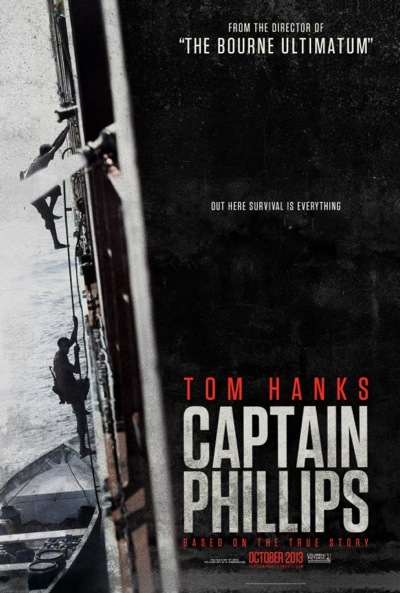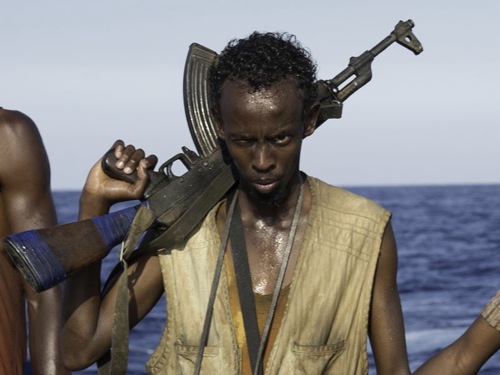
While Tom Hanks is receiving widespread praise for his performance as the besieged cargo ship skipper in Paul Greengrass's CAPTAIN PHILLIPS, it is impossible to imagine him being pushed to such emotional extremes without the peculiar menace of Barkhad Abdi, who makes his feature debut in the film as Muse, the leader of a small band of Somali pirates. Greengrass is careful to portray Muse as a young man with two options: poverty or piracy. Muse has chosen the latter, even though that game is thoroughly rigged and unlikely to significantly improve his financial situation (almost all of the money goes to the kingpins and their sponsors). Like nearly every gangster who came before him, Muse is just a young man with no future.
At 5'10" and 120 pounds, Abdi is no bruiser, but he has an intensity and intellect that draws us into Muse's predicament. It doesn't take long for Muse to realize he's hooked a fish he can't possibly reel in; once he's thrust into a negotiation with the U.S. military, his best-case scenario is surrender. As viewers, we are firmly invested in the survival of Captain Phillips, but watching Muse's determination diminish by the minute is tragic. It's not easy to elicit sympathy for a thug, but Abdi convinces us that there's more to this kid than criminality. He's not dreaming about the top of the world; he just wants a life.
Abdi was born in Somalia, but the intensifying Civil War forced his family to move to Yemen when he was seven. Eventually, the family found their way to Minneapolis, Minnesota, where Abdi developed an interest in directing music videos. But Abdi's life changed one night in his mid-twenties when he was hanging out with his friends watching TV. Having spent some time with the actor during the CAPTAIN PHILLIPS junket in Los Angeles, I'll let him tell you the story.

Mr. Beaks: How did this whole thing come about?
Barkhad Abdi: Honestly, I was just at my friend's house hanging out. Just another night. I usually don't watch TV, but someone turned on the TV and it said "Casting call... Tom Hanks... Somali actors." And I was like, "Okay, I'll check this out." So I went there and it was just a crowd of people, like more than 300 people there. I stood in line, and they asked me "What's your name? Where were you born? How old are you?" So I tell them that, then they give me this paper and say, "Study this part. Memorize these lines and come back tomorrow." I come back the next day and it's a [smaller] number now, and they told us to either form our own group or they'll form a group for us. So I found some friends who I'd grown up with and was comfortable with, and once we found out we had different characters to audition for, we formed our own group. That first day we didn't do that good, but we went home and practiced. We practiced, came back and auditioned again. We auditioned a few times, and then there was silence for two weeks. No one knew what was going on. "Did they call you?" "No. Did they call you?" "No. They must've called the other guys. We missed it." Never mind! We just lived our life. We didn't care. In my head, I was just, "If I get it, I get it. If I don't, why stress it?" So maybe two weeks later we get a call from Francine [Maisler, who cast the film]. And she said, "You have to come to L.A. The director wants to meet you guys." She didn't tell us we got the part. So we came, and Paul actually told us we got the part. We were at Shutters in Santa Monica, and we actually jumped in the ocean with all our clothes on. We were so excited.
Beaks: I read that you naturally emerged as a leader in your group. Why do you think that was?
Abdi: Faysal [Ahmed]... I was friends with his older brother for years. Little B [Barkhad Abdirahman]... I'm friends with his older brother. Mahat [Ali] was new to the neighborhood; he came to the U.S. in 2006. So I'm like a big brother to them. And I had experience with cameras because I used to do music videos, so they were kind of looking up to me just out of respect. But that's all.
Beaks: Paul Greengrass has a way of shooting that is quite particular to him. This was your first feature, and you're working in a completely unconventional manner. Did you like this style of shooting?
Abdi: I loved it. I think it's great. It's the best way to shoot a film. I love shooting films that are so close to reality; I like movies that, when people leave the theater, they still think about it. Those were the types of movies I used to look for. THE USUAL SUSPECTS, CITY OF GOD... movies that, when I watch them, I leave and I'm like "Wow!" Those are my kind of movies, so I wanted to do something like that. And the story of [CAPTAIN PHILLIPS] itself is incredible. I remember watching it on CNN and being like, "Wow! What's going to happen?" And the Navy said, "Phillips survived, they arrested this guy, and the rest passed away." I thought, "That could've been a good movie." They even said that on TV then.
But it's just how Greengrass does it. He wouldn't force me to follow the script. I mean, I'd follow the script. That was a must. But he wouldn't have me go word by word for the script. As long as I was staying [close] to it, it was fine. That kind of made it easier for me. I just follow the story and go with it.
Beaks: Just be in the moment.
Abdi: Be in the moment. Make it my own. It was great. I used a lot of imagination.
Beaks: Did you have any concerns about the portrayal of the pirates?
Abdi: We had some concerns as Somalians. There was definitely concern. The piracy thing was just extraordinary... crazy. But, you know, I didn't want it to be like another Hollywood movie. It wasn't my idea what happened. I liked it, and I supported it, and I'm glad it happened that way, but it wasn't me who came up with the idea. It was all Paul Greengrass that told us to do that. But I was glad to be a part of it because... these people are desperate people. And there is nothing worse than a man who has nothing to lose. That's the worst you could do to a human being. I would put myself in that situation at times, if I wasn't lucky enough to have parents that got me out. What if that was me? How would I do it? I want to get the money. I don't want to kill no one. I want to go back. Because there's nothing else I can do now. There are no jobs, no school, and I'm a human being. I want to become somebody. I want to have a life. It was very difficult, and I know exactly where they're coming from. That's what makes it different. They're just gangsters, but you know why they're gangsters. That makes a difference. There are gangsters all over, but there are some who choose to be gangsters when they have another way out. And there are some who are gangsters because there is nothing else there. So I feel some empathy towards them because... these people at a young age have been through this.
I'm not going to say life is not fair. It happens, and you have to live with it. I don't agree with them. I believe there is always a way out. You know how they say after a storm there is a rainbow? After a bad day, there is always a better day. My life is an example. It felt like all the doors were closed and there was no way out. As long as you're patient and do the right things, there should be a way out.
Beaks: How involved were you in the stunt work? It looks like you guys are mixing it up a good deal in this.
Abdi: We had training for about a month and a half. When we first got there, we had training. I didn't know how to swim. Most of us didn't. So every day we had to wake up, go to the pool, and they'd teach us how to swim. Then we'd come back and learn how to do stunt fights, shoot guns, climb... then we'd go to the ocean and ride skiffs, and we had to learn how to stand still. Paul didn't want big fights, he just wanted to make it all believable. So everything was real. It was just like, "Go do it." So I'd put myself in that situation and believe that I am that guy. You know what they say: "The best lies are the ones you believe."
I do believe Mr. Abdi ended our interview with a SEINFELD reference. I will now personally finance his Best Supporting Actor campaign.
CAPTAIN PHILLIPS is currently in theaters. It's a masterfully crafted docudrama from one of our top filmmakers. Go.
Faithfully submitted,
Mr. Beaks
